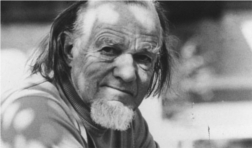Francis Schaeffer was the director of a Swiss retreat center, L’Abri, and became well known as a teacher and defender of the Christian faith. Schaeffer and his wife, Edith, had moved to Europe to work with a Christian children’s ministry, but they ended up founding L’Abri in the village of Huemoz, Switzerland, in a cottage that also served as their home. L’Abri became a place where hundreds and eventually thousands of seekers and skeptics came to have their spiritual and intellectual questions answered.
Schaeffer’s daughter Priscilla remembers the excitement she felt as a university student when she realized that her friends at the university were drawn to the Christian faith through interacting with her father.
There wasn’t anybody I couldn’t bring home, no matter how eccentric, how rebellious, how blasphemous. …I didn’t have to be ashamed. [1]
The seekers and skeptics who came to L’Abri were minister to at every level of their humanity — intellectual, social, spiritual. Intellectually, Schaeffer presented Christianity as an all-encompassing world-and-life-view that outstripped all other such views. Socially, seekers took part in meals and even fellowship with the Schaeffer family and other guests. In terms of their inner spiritual life, they were encouraged to read the Scriptures, pray and spend time in solitude and reflection.
Notably, the Schaeffers viewed those to whom they minister as important people who were worthy of time and attention. One L’Abri participant, Dorothy Hurely, remarked:
When Mr. Schaeffer would talk to you, there was nothing else in the world that was going on. He was totally focused on you and what you were talking about and was very involved, very interested. It wouldn’t matter who the person was. It could be from the most simple person to the most intellectual — that focus and interest and involvement was the same. I saw it time and time again. I experience it my self, and it wasn’t anything false. He was really interested in people, and it was something that was very striking. I’d never seen that degree of concentration and having that kind of attention, I don’t think, with anybody else. [2]
Schaeffer’s biographer, Colin Duriez, summarized his interviews with L’Abri participants by describing Schaeffer’s approach as one which was marked by kindness:
His preferred medium was talk — conversation, whether with an individual or with a large group of people. He had the uncanny knack of addressing an individual personally, even if one was sitting with several hundred other people. His tapes, books, and filmes are best seen as embodiments of his conversation or table talk. The overwhelming impression of those who met him briefly or more extensively, particularly in connection with his homely yet expansive community at L’Abri in Switzerland, was his kindness, a word that constantly occurs in people’s memories of him, whether Dutch, English, American, Irish, or other nationality. [3]
As Schaeffer listened to a person’s life story and to their questions, doubts and concerns, he was able to locate common ground with that person and show the ways in which their (non-Christian) worldview was unable to make sense of things for them. Only Christians can make sense of one’s inner life, one’s intellectual questions and of the world at large.
In his efforts to commend Christ, Schaeffer also produced resources.
- In How Should We Then Live? The Rise and Decline of Western Culture (which is a book and a film series), Schaeffer tries to show how the Christian worldview is the only enduringly viable worldview for sustaining a civilization, and how European and American rejections of that worldview were detrimental.
- In The God Who Is There, he argues that God exists and is relevant to human concerns.
- In Escape from Reason, he shows how the rejection of the Christian God causes a person to lose contact with reality and become increasingly irrational.
- In Pollution and the Death of Man, he addresses ecological issues from a Christian point of view.
- In A Christian Manifesto, he provided a Christian response to Karl Marx’s Communist Manifesto and to the Humanist Manifesto of 1973.
Schaeffer treated individuals as God’s unique creations, made in God’s image and likeness.
We can learn many great lessons Schaeffer’s life and ministry. Here are a few examples:
- Understand Christianity and culture.
Schaeffer expended great effort to understand not only Christianity but also his cultural context. This dual understanding allowed him to be effective as an evangelist and apologist. - Love unconditionally.
Schaeffer treated individuals as God’s unique creations, made in God’s image and likeness. Even when — and especially when — he disagreed with their ideas or actions, he treated them with kindness and respect. - Value community.
Francis and Edith recognized the value of Christian community, so they created an environment in their home that would allow unbelievers to share meals with them, to live life together with Christians and to otherwise experience Christian love.
In what ways do Schaeffer’s example and insights on cultural engagement challenge you in your everyday activities?
This post is a modified excerpt of Dr. Ashford’s new book, Every Square Inch. Learn More>>
[1] Colin Duriez, Francis Schaeffer: An Authentic Life (Wheaton IL: Crossway, 2008), 136. Duriez interviewed Priscilla in 2007
[2] Duriez, Francis Schaeffer, 145.
[3] Duriez, Francis Schaeffer, 9.






Comments and Pingbacks
2016-03-04 12:02:07
Weekend Reading: Lecrae, the Dangers of Charity, Parenting and Politics | Intersect
[…] Lecrae’s recent musical decisions have left some Christians puzzled. But Alexander Bouffard says that they make perfect sense; Lecrae is channelling his inner Francis Schaeffer: […]
2017-01-11 07:42:00
3 Authors Who Changed My Life | Intersect
[…] Francis Schaeffer was an American who lived in Switzerland during the middle of the 20th century. He and his wife, Edith, were known for starting a retreat center — L’Abri — which ministered especially to skeptics and freethinkers, and to those who were hurting spiritually. […]
2017-02-14 06:32:05
Six Heroes of Cultural Engagement | Intersect
[…] Francis Schaeffer […]
2019-09-25 06:01:35
"A True Friendship Between Equals": Growing Up with Francis Schaeffer as a Father | Intersect
[…] Francis Schaeffer was one of the brightest Christian thinkers of the 20th Century. Dr. Bruce Ashford describes his influence this way: […]
2019-10-01 09:46:12
Udo Middelmann: On Francis Schaeffer's Personality and Life Themes | Intersect
[…] Francis Schaeffer was one of the brightest Christian thinkers of the 20th Century. Dr. Bruce Ashford describes his influence this way: […]